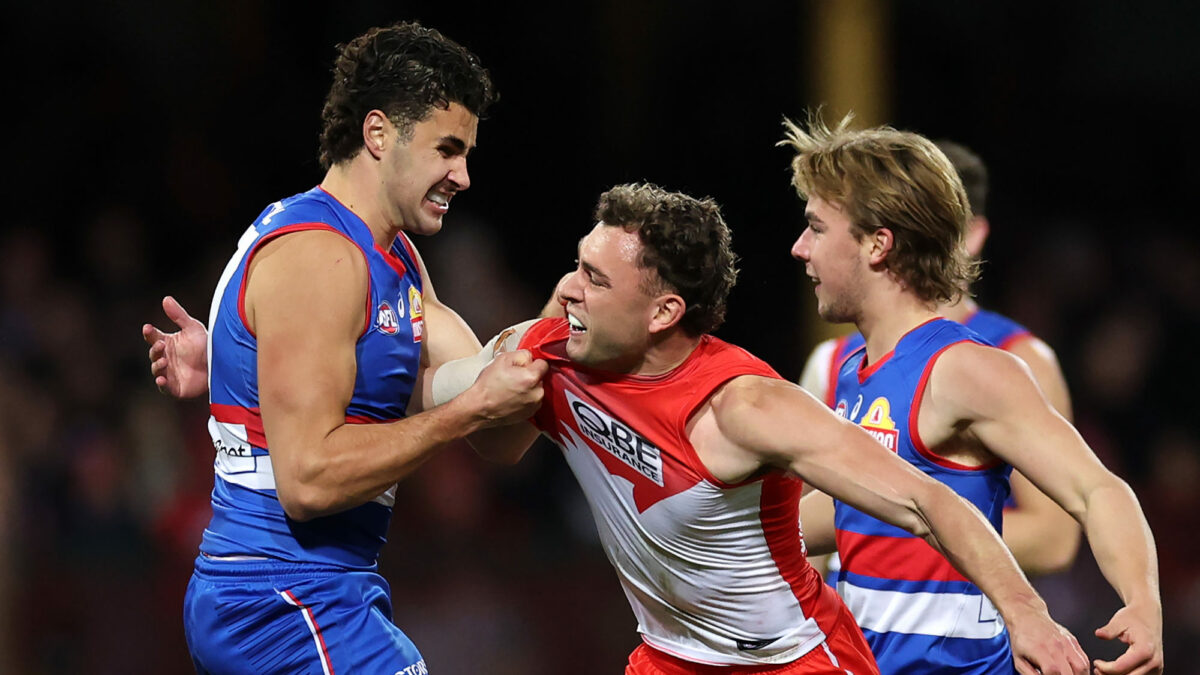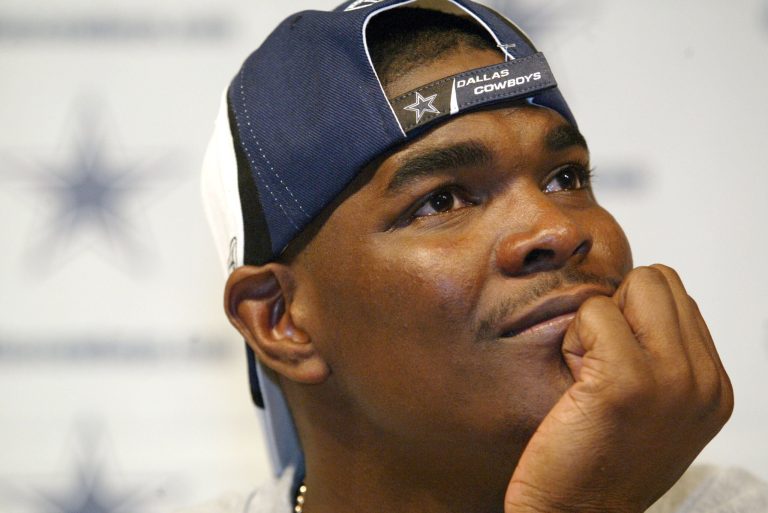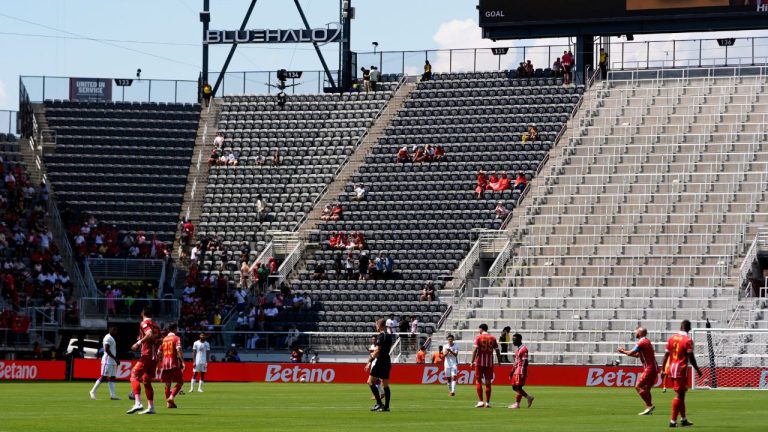You can pretty much pinpoint exactly the three main talking points out of the Western Bulldogs’ thrilling Friday night win over Sydney.
One: the utter, dangerous disgrace that was the SCG turf. Two: the Swans’ rediscovered fearsomeness with Errol Gulden and Tom Papley back and fully firing as offensive weapons. And three: how Sydney paid the ultimate price for their continued waywardness kicking for goal.
In a game decided by just nine points, booting 4.10 from set shots – the Bulldogs, by comparison, had 8.5 – is a coach-killer, and quite possibly a season-killer too, given defeat leaves the Swans three wins and percentage outside the eight.
With Joel Amartey sidelined after last week’s 0.6 against Port Adelaide, his teammates proved more than capable of picking up the slack, with a 3.7 start leaving the Swans a step behind the game from the outset and their chances finished by Hayden McLean sending a supremely gettable kick into the post in the final minute.
But in actuality, the Swans’ kicking for goal wasn’t the primary reason their hopes of turning their season around have now been all but dashed – indeed, their stunningly accurate run from quick snaps throughout the night meant that despite their early profligacy, they only ended up a few points behind their expected score for the night.
No, the Swans lost thanks to a familiar problem – a brittle backline exposed by quick ball movement down the SCG corridor, and some devastatingly costly turnovers when attempting the slingshot plays that powered them to last year’s grand final.
Conceding 16 goals and 18 marks inside 50 from just 46 entries, against a team whose major strength is its dominance of territory rather than its efficiency, is what truly cost them victory.
To keep Sam Darcy to just one mark inside 50 despite the late withdrawal of Tom McCartin was a superb team effort led by Lewis Melican; to allow the Dogs 16 goals despite that is a damning indictment on the Swans’ defensive structure, the consequence of which is that a night which yielded 26 scoring shots and a score of 96 ended in defeat.
The holes were manifest from the opening quarter, with the Dogs’ aggressive handball game and surfeit of forward runners in midfield enabling them to surge right at Sydney’s defence, and where other teams would block up pathways to goal and force either a stoppage with fierce tackling or a high, hacked ball to be mopped up, the Bulldogs found ways to get clear shots at the big sticks – and make them count.
Leaving Darcy inside 50 like this is almost a war crime; making matters worse, it happened again in the second quarter, with the big Bulldog’s brilliant skill to slot a third goal from the boundary.
The key culprit in the second goal is Dane Rampe: holding his space a kick behind the ball as the footy squirts out the back to the advantage of Darcy, the Swans veteran is far too slow to push up and harass the Bulldog, allowing him to close the gap to goal to kickable range, from which the only question was accuracy.
Whether McCartin would have helped matters is anyone’s guess: but it was glaring how little influence all night the Swans’ spare behind the ball had.
Part of it was the natural convergence on Darcy to ensure every marking contest the star Bulldog came at resulted in him being outnumbered; much of it, though, was to do with positioning.
In the below play, the Swans’ loose man behind the ball is in no-man’s land, right in the central corridor and powerless to do anything about a Tom Liberatore snap inside 50 that needed to be intercepted, especially when Aaron Francis tripped on the diabolical turf and went sprawling to leave Aaron Naughton free.
This seemed to be a tactic from the Swans: forego a spare behind the ball to help out their defence in favour of a spare wide. Whenever given the chance, Sydney’s first ploy, unless there was an obvious target in the corridor, was to switch the play wide, using their leg speed to expand the ground and force the Dogs to defend the SCG’s full length.
As an attacking strategy, it worked to a point – but it’s worth noting the majority of the Swans’ scores came via stoppages, and in particular some scintillating Brodie Grundy tapwork to free up predominantly Isaac Heeney, but several other teammates as well.
Often, the switch, or indeed any lengthy period of possession for the Swans, resulted in something that has cruelled them all season: turnovers.
Nick Blakey missed more targets in one evening than I saw him miss in 2025 as a whole: the Swans’ most penetrating, dangerous kick coming out of defence, he has the licence to go for ambitious targets to try and open up opposition teams, but when it goes wrong, as it did repeatedly in the final quarter especially, it spells serious trouble.
It’s not the only flaw in Blakey’s, and indeed the Swans’, gameplan on Friday night: their desire to spread, to move the ball quickly from inside to outside at any point of congestion and attempt to rush forward, had a fatal counterweight, perfectly epitomised by this brilliant Marcus Bontempelli goal in the third quarter just when it seemed like Sydney had taken control.
With the ball in dispute just metres from him, Blakey holds back from even attempting to influence the contest, be it by winning the footy or laying a tackle: he leaves that job to Angus Sheldrick, hoping that if he wins the groundball, he’ll be able to flick it out, where the Lizard is waiting to go on one of his dashing runs.
But instead, it’s Joel Freijah who wins out, with the result that Blakey is left looking foolish as the ball turns the Dogs’ way and ends with Bontempelli capitalising on the half-chance.
To be sure, that ploy worked well for the Swans at key stages: most notably in this first-quarter passage, when the decision by Justin McInerney and Chad Warner to stay on the outside and leave Sheldrick fighting a two-on-one with Liberatore and Matt Kennedy for the hard ball paying dividends when the Swan somehow muscled the footy clear.
The problem, though, is that tactically, this isn’t the way to stop the Bulldogs’ handball game, a handball game that led to wave after wave of running goals once the ball came out into space, and resulted in answering majors time and again whenever the Swans threatened to break the game open.
Hawthorn identified a few weeks ago that the key to nullifying the Dogs is to bring the pressure directly at them: to not give those fast hands a split second with which to work in, but instead converge on the ball carrier, swamp any space available to them, and bottleneck the game.
That night, the Dogs mustered just eight goals and lost; against the Swans, for the eighth time in their past nine games, Luke Beveridge’s team hit triple figures, and came up trumps.
That the Swans’ pressure numbers were consistently superb hides the truth: yes, repeat stoppages became the norm later in the game, but when the Dogs broke, they broke hard, fast, and with open spaces ahead to run into.
Capitalising hardest was Joel Freijah, for whom three of his four goals came running towards the big sticks with a Swan on his heels, having worked his way goal side.
Tactically, this is a painful lesson for Dean Cox to learn, because in many aspects, his Swans were brilliant on Friday night.
They murdered the best stoppage team in the game at scores from clearances, kicking five goals from forward-50 stoppages alone: with Grundy monstering Tim English and feeding his midfielders a banquet with his taps, Heeney a perpetual menace whenever the ball went anywhere near him, Errol Gulden’s kicking sublime throughout and Chad Warner a damaging influence with his explosive speed away from the coalface – plus Tom Papley buzzing around anywhere within 70 metres of goal – this is the first time all year Sydney have looked like the team that powered their way to a grand final last year with the AFL’s most watchable brand of footy.
But if this was Sydney back to something near their best, it’s a deep concern that the result isn’t just defeat, but one in which a triple-figure score was leaked despite winning both the inside-50 and clearances stat.
And forget about this year – that defensive fragility may prove an impediment in the years to come if the Swans wish to become a September staple.







